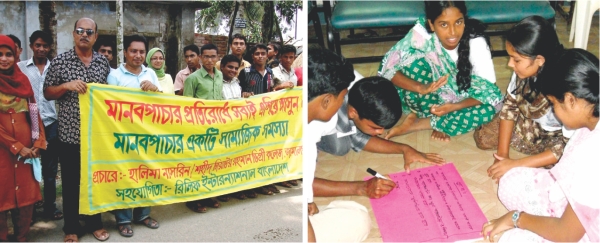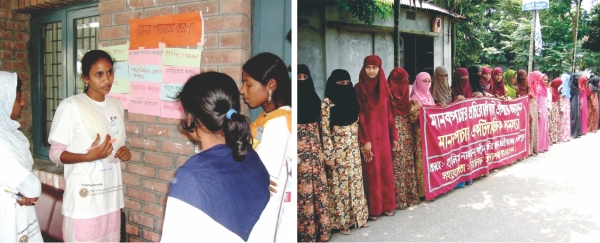| Home - Back Issues - The Team - Contact Us |
 |
| Volume 10 |Issue 38 | October 07, 2011 | |
|
|
Endeavour The Voice of the Citizen M Rahman It was September 25. It might have been an ordinary day for most people, but it was a special day for Mohammad Shahjahan, a student of class X, from Tilakpur village in Dewanganj upazila in Jamalpur district. He had no access to daily newspapers in his remote erosion-prone village. Even in his school, Bangladesh Railway High School, in Dewanganj, there was no library facility to keep him connected to the outside world. But on that particular day, Shahjahan learnt how he could access newspapers using internet facilities at his school and in the newly introduced information centres in Union Parishads. He, along with 31 other students from six high schools of three upazilas in the district, took part in a workshop organised by Relief International, an international rights organisation. The four-day long workshop discussed how students could play an active role in addressing social injustice in their own neighbourhoods through the use of modern technologies.
In the workshop, the 32 children learnt how to use the internet. Shahjahan, son of a construction worker, says, “Earlier I had never heard of blog, facebook, website, email or internet; I was not aware that I have the right to use internet facilities at my school and at the information centre of my Union Parishad.” They also learnt what it means to be a citizen journalist in a democracy. Citizen journalism is when ordinary individuals in a society take up the responsibility of reporting and disseminating information, usually through the use of internet or other technologies. Shahjahan comments, “Now I will be able to use internet to read out different dailies and to play a role as a citizen journalist in case of human trafficking and other social injustices around my neighbourhood.” Six teachers who attended the workshops as guardians of the students promised that they would arrange internet connectivity of the computers at their respective schools so that the students can use the internet. Another participant, Rita Akhter, also a student of Class X, says, “Now I feel I can maintain a connection with the outer world. My habitat being a river eroded area is virtually disconnected from the outer world. That makes it a den for corrupt people who take advantage of people's poverty to allure women and female children. They sell girls in the name of giving them jobs as domestic help in the capital and other towns.” In most cases, she adds, the women and the female children are confined to their workplaces, barred from communicating with their families. A participant teacher talked about how sometimes poor women and children are sold to brothels inside the country and in India. She shared the story of a young girl who recently escaped from a brothel broker in Ahmedabad of India, while her younger sister was still confined to an Ahmedabad brothel. I contacted the young girl, Hena (not real name), who described how she was trafficked and how she had managed to escape. She complained about the negligent role of local law enforces in rescuing her trafficked younger sister. While talking over cell phone, Hena broke down into tears, making repeated appeals for help in rescuing her trafficked sister from Ahmedabad in India: “I, with my younger sister Rima (not real name) and our widow mother was living in a slum near Jamalpur Railway Station” Hena, who used to be a local NGO worker and sole income-earner of the family, lamented that if the local police took the matter seriously and arrested Mamata (the person who had lured them into leaving their homes) and her accomplices immediately, her (Hena's) younger sister could be rescued.
Jamalpur is a border district, in which several traffickers' gangs are active. The role of citizens can be extremely helpful in reducing human trafficking. The authority of Relief International, an international rights body, who organised the four-day long workshop from September 25 at Jamalpur district headquarters discussed how a student can play a role in checking the trafficking of poor women and children in their neighbourhood. The speakers at the workshop referred to the Milon killing incident at Companyganj of Noakhali. The police had picked him up in their vehicle in the morning on July 27 and later handed him over to an agitated mob who beat him to death as a suspected robber. However, a man took the footages of the incident and gave them to a private TV channel which broadcasted it. The broadcast drew the attention of the nation; consequently, the involved police were suspended and now they are facing trial. If the man had not done his role as a citizen journalist, the incident would have been dropped. This kind of citizen journalism can be instrumental in exposing trafficking incidents. Students for instance, can report cases of trafficking to their local media and the internet will give them access to the national dailies where they can send the information. Programme officer, Eather Newaz of Relief International, who coordinated the workshop, says, “We have undertaken a two-year-long programme from November 2010 at three upazilas—Dewanganj, Bakshiganj and Melandaha of the district where many female children and women become vulnerable to trafficking due to losing their family livelihood in river erosions over the decades.” She said that so far they have held five such workshops involving 118 students and 20 teachers from six schools, colleges and Madrashas of the three upazilas. She added, “We also gave monitoring help to 20 students so far to hold rallies, human chains and cultural programmes involving their classmates to create awareness among people about human trafficking.” The writer is Staff Correspondent, The Daily Star.
Copyright (R) thedailystar.net 2011 |
||||||

